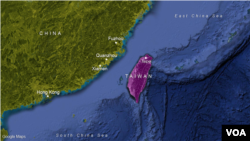A strategy outlined this month by China for Taiwan, a self-ruled democratic island, shows the Communist government's resolve in unifying the two sides without making any new threats, experts say.
The Taiwan Affairs Office statement mainly amplifies China's previously stated ambitions, said Denny Roy, senior fellow at the East-West Center think tank in Hawaii.
Liu Jieyi, head of China's Taiwan Affairs Office, said the strategy would resolve risks related to Taiwan by creating a "favorable environment," the South China Morning Post reported.
China prefers peace over conflict with Taiwan and promises it a degree of autonomy under a "one country, two systems" model of government if unified, Liu said.
He said the Chinese government's "comprehensive strength" would help unify the two sides and that tension between them would fade as that strength builds. Unification "should be promoted as part of the country's rejuvenation," Liu said.
"Anything that makes Beijing think time is on its side is good,” Roy said, “because that strengthens the case for patience rather than attacking in the near future out of a belief that the trends are unalterably averse to China."
Military muscle flexing
The biggest challenge to the strategy, Liu said, is Taiwan residents pushing for independence. "We do not promise to renounce the use of force and reserve the option of taking all necessary measures," he said.
Taiwan should expect more shows of military strength, especially after China's mid-June statement that the ocean strait between them is territorial rather than international, said Brian Hioe, founding editor with Taiwan-based media outlet New Bloom.
"This has sparked concerns that China may step up gray-zone warfare or measures targeting outlying islands of Taiwan," Hioe told VOA.
China has claimed sovereignty over the self-ruled island since the Chinese civil war in the 1940s, when Chiang Kai-shek's Nationalists lost to Mao Zedong's Communists and rebased in Taiwan, also called the Republic of China. Beijing has said it would use force, if needed, to unite the two sides. China and Taiwan lack formal diplomatic relations and have not spoken since 2015.
Since mid-2020, the People's Liberation Army Air Force has flown fighters and bombers over part of the Taiwanese air defense identification zone almost every day.
Last week, as a reaction to Florida Senator Rick Scott's visit to Taiwan, Wu Qian, spokesman for China's Ministry of National Defense, said its Eastern Theater Command organized a "joint combat readiness security patrol and combat training exercises" around Taiwan's airspace "in response to the vicious acts of collusion and provocation by the U.S. and the Taiwan region" according to state media China Military Online.
Follow-up to past pledges
Communist Party leaders had said in November they would produce a Taiwan strategy based on statements by Chinese President Xi Jinping, and the Taiwan office's statement offers follow-up ahead of the 20th Party Congress in late 2022, Roy said. The congress meets every five years.
That Taiwan Affairs Office statement poses no new threat, said Joanna Lei, CEO of the Chunghua 21st Century Think Tank in Taiwan.
"If we read the tea leaves and believe that it sends a signal of intensified military threat, I don't think so," she said. "I think that would be too much."
Liu's remarks lay a foundation for the Cross Strait Forum exchange of cultural and economic issues between the two sides, Lei said. The event organized by Beijing is scheduled for Tuesday and expected to draw 2,000 people.
Taipei's response
In Taipei on Wednesday, the government's Mainland Affairs Council rejected China's strategy.
"Officials in Beijing do not wish to look correctly at the basic fact that the two sides of the Taiwan Strait are not affiliated with each other," council spokesperson Chiu Chui-cheng said.
Most Taiwanese oppose unification and should decide on their own what kind of relations they want with China, Chiu told a news briefing.
A survey released earlier this year by the Election Study Center of National Chengchi University found more than half of Taiwan's residents combined want to either keep the status quo indefinitely or decide later the question of unification with China.








